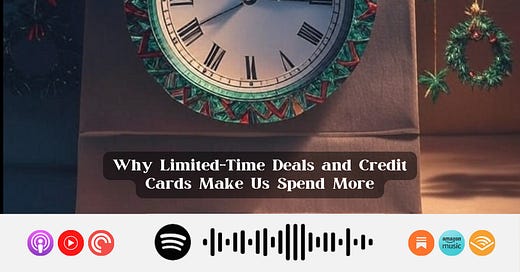Source: Kathuria, A. and Bakshi, A. (2024), "Unveiling the dynamics that shape online impulse buying behavior", Journal of Research in Interactive Marketing, https://doi.org/10.1108/JRIM-03-2024-0147
With Christmas right around the corner, many of us are in the mad rush of last-minute holiday shopping. Have you ever asked yourself why those "Limited Time Only!" deals are so hard to resist, especially when you happen to have a credit card on hand? Recent research from the Thapar Institute might shed some light on this strange phenomenon. Let's see what it reveals about the psychology behind our online shopping impulses.
The Perfect Storm: Time Pressure and Easy Payment
The holidays are a "perfect storm" for impulse purchases, according to researchers. When retailers mix limited-time offers with convenient payment options, they activate powerful psychological triggers that push us toward the kinds of decisions we wouldn't normally make.
Why Limited-Time Deals Work So Well
Imagine: You're hunting for gifts when, suddenly, that "perfect" item is under a "Next 2 Hours Only!" deal. Your heart rate jumps a little bit, and you find your fingers punching the "Buy Now" button. This isn't accidental; it's science! The research suggests that limited-time deals set off two main things:
An immediate sense of urgency
Fear of missing out (FOMO)
These work together to bypass our normal decision-making process, which leads us toward the much more spontaneous kind of purchase that may or may not be a good idea for us.
The Credit Card Effect
Have you ever considered how much easier it is to spend with a credit card? The research confirms that this is not just a hunch; it's real. Credit cards greatly reduce what researchers call the "pain of payment." And because the "pain" is reduced, that makes us all the more likely to impulsively purchase items that might or might not be a good idea.
The Role of Pleasure in Shopping
Perhaps the most interesting finding is how hedonic motivation—the pleasure we get from shopping—functions as a bridge between marketing and our buying decisions. During the holidays, this pleasure-seeking aspect becomes more pronounced as shopping takes on additional emotional meaning.
What This Means for Marketers
Effective Strategies:
Strategic timing of limited-time deals
Clear visibility of countdown timers
Prominent display of credit card benefits
Mobile-optimized shopping experiences
Responsible Marketing:
Implementation of spending alerts
Educational resources about financial management
Cool-off periods for large purchases
Tips for Mindful Holiday Shopping
These marketing tactics are potent, but understanding how they work might help us make better purchasing decisions:
Set a holiday budget before browsing
Use spending alerts on your credit cards
Take a "cooling off" period before making large purchases
Be aware of how limited-time deals affect your emotions
The Future of Online Shopping
As e-commerce grows, so, too, does the importance of understanding these psychological triggers, for both retailers and shoppers. The key lies in finding the right balance between effective marketing and responsible consumption.
Whether you're a marketer making decisions or a consumer wading through holiday deals, learning about these psychological tools might lead to some sound decisions. After all, the best shopping experiences happen when retailers and customers both win. While the pull of limited-time deals, plus the convenience of credit cards, might make the process of holiday shopping seem easier, learning about the science behind these tactics makes sure we are able to control, or at least be more aware, of what we are doing, why we are doing it, and if that aligns with what we truly need to do. Happy mindful shopping!














Share this post